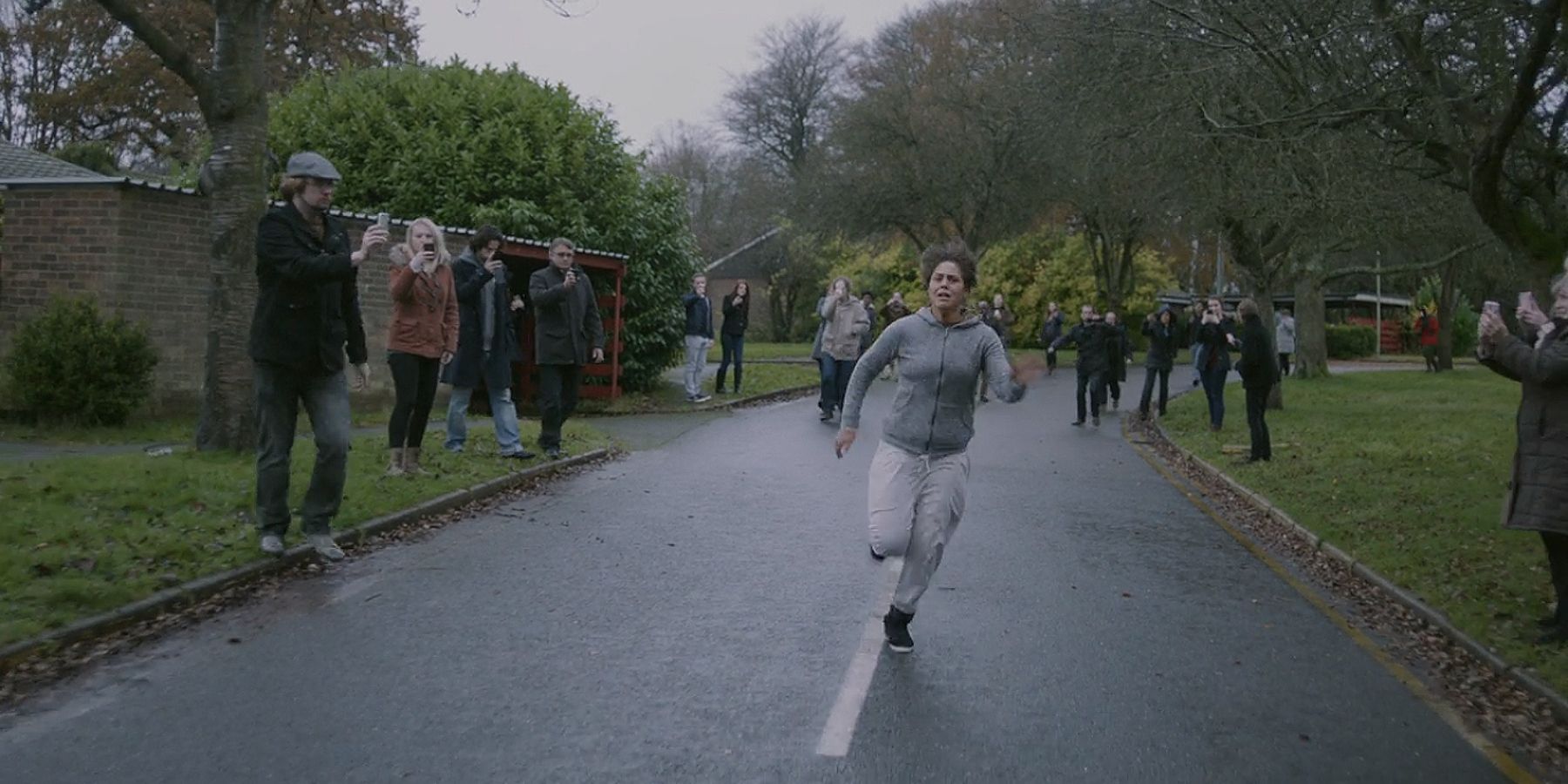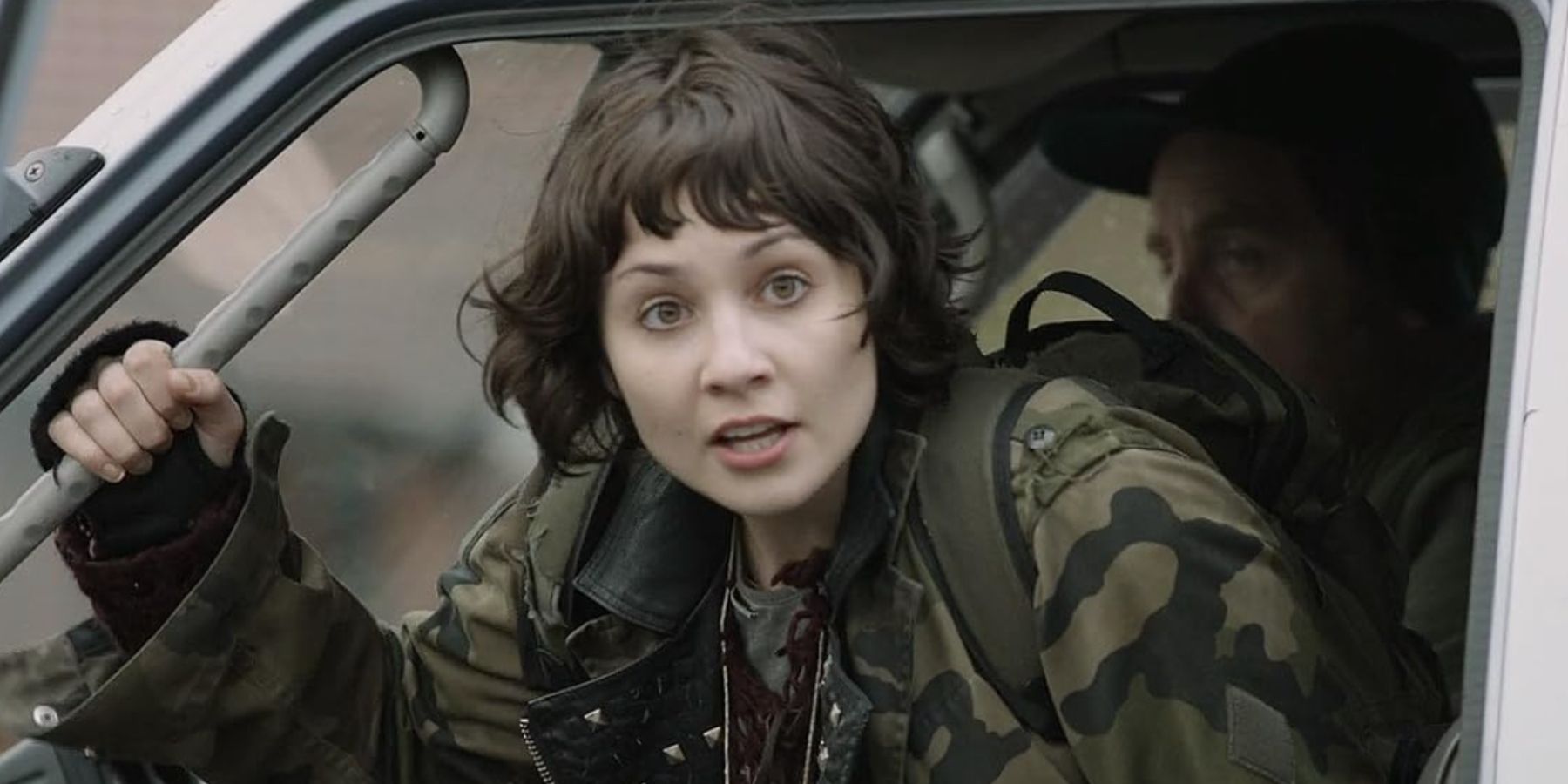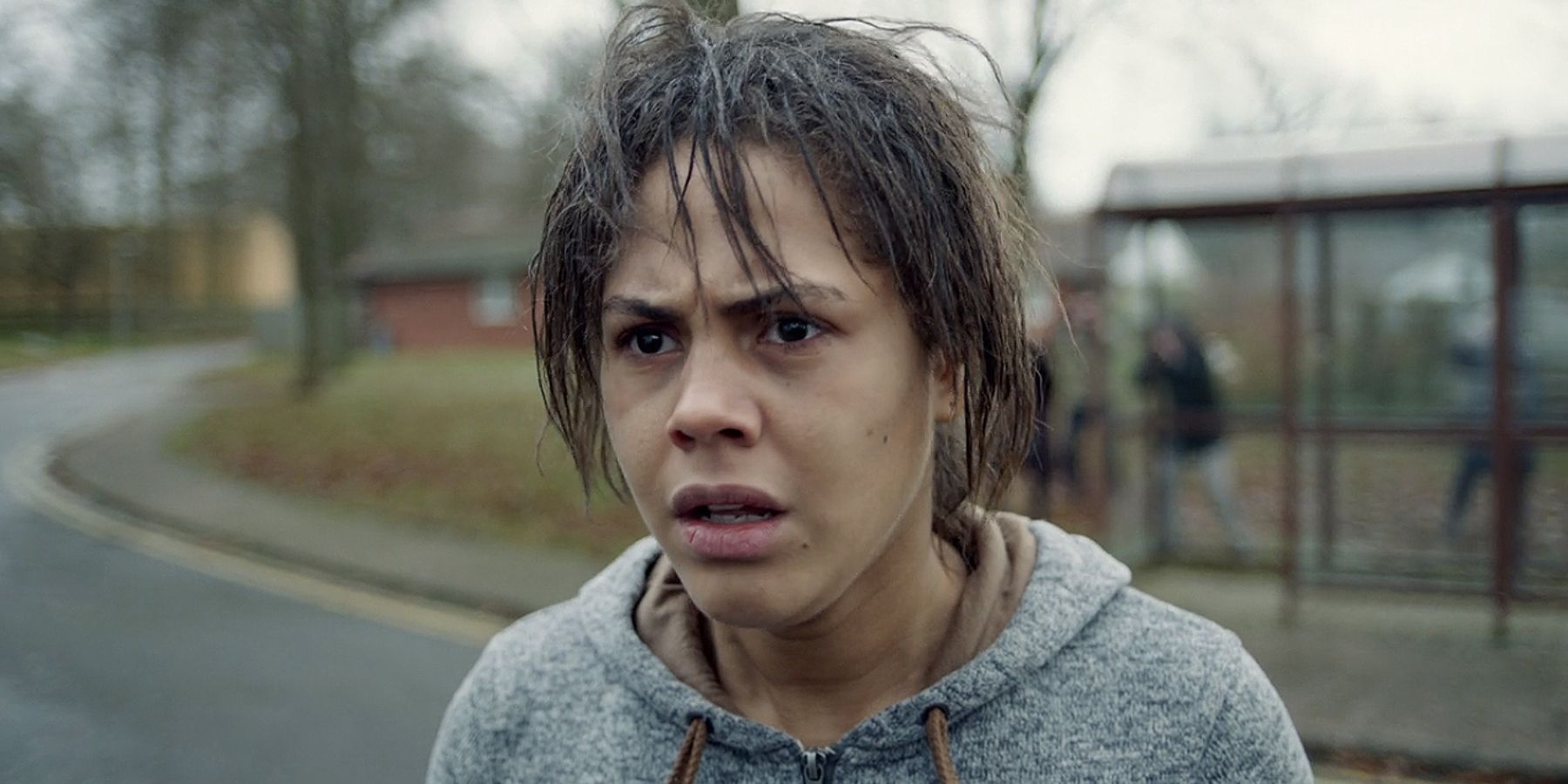Black Mirror White Bear - A Look Inside The Twisted Tale
Have you ever stopped to consider what true justice might actually look like, especially when it is handed out in a very public way? It is a thought that, you know, can send a shiver down your spine, and it is a core feeling that the "White Bear" episode of Black Mirror really digs into. This particular story, which is the second one from the show's second set of episodes, continues to stick with people long after they have seen it, making them think about what it means to be held accountable and what role onlookers might play.
This installment, written by the series' original creator and guiding hand, Charlie Brooker, and brought to life by Carl Tibbetts, offers a rather chilling vision of a world where consequences are, in a way, transformed into a kind of public spectacle. It follows a woman named Victoria, who, basically, wakes up one day with no recollection of who she is or what has happened, only to find herself being pursued by masked figures and watched by a crowd that seems to enjoy her distress.
The whole episode, really, gets you thinking about bigger ideas, such as how we decide what is fair, the purpose of suffering, and the sometimes uncomfortable connection between what we see on screens and how we behave. It is, for many, a prime example of how Black Mirror manages to be so ahead of its time, presenting ideas that feel, honestly, very relevant to our own lives.
Table of Contents
- The Story of Black Mirror White Bear
- What Is the White Bear Symbol Really About?
- The Screens and the Spectacle in Black Mirror White Bear
- Is This True Justice or Something Else Entirely?
- The Shocking Revelation of White Bear
- How Does Black Mirror White Bear Connect to Us?
- A Look at the Episode's Lasting Impact
- White Bear - A Powerful Entry Point to Black Mirror
The Story of Black Mirror White Bear
The story, basically, begins with a woman named Victoria. She wakes up, and there's this immediate sense of something being wrong. She doesn't remember anything, not her name, not where she is, not what happened before. It's a really disorienting feeling, you know, to just open your eyes and have no connection to your past. And then, almost immediately, she finds herself in a truly frightening situation. People wearing masks are after her, trying to hurt her, or worse. And what makes it even more unsettling is that there are other people, just standing around, watching. They aren't helping; in fact, they seem to be enjoying the spectacle, recording it on their phones, almost like it's some kind of twisted public show.
As Victoria runs, trying to make sense of her surroundings and escape her pursuers, the viewer is pulled right into her confusion and fear. She encounters other people who seem to be just as lost, or perhaps even more resigned to their strange circumstances. The world around her feels broken, a place where the normal rules of human kindness just don't seem to apply. It is, in a way, a very raw depiction of a person facing something completely outside their grasp, with danger closing in from all sides. The episode keeps you guessing, making you wonder what is going on, and why no one is stepping in to help this woman who is clearly in distress.
The pacing of this part of the episode is, honestly, quite relentless. Victoria's flight from the masked figures, who are often called "hunters," and the uncaring onlookers creates a constant feeling of unease. You see her desperation, her attempts to find safety, but there seems to be nowhere to go. The people holding up their phones, recording her suffering, are a particularly unsettling detail, making you think about how we, as a society, sometimes consume the misfortunes of others as if they were just another form of entertainment. It's a pretty stark look at a world that has, in some respects, lost its sense of empathy.
- %D9%81%DB%8C%D9%84%D9%85 %D8%B3%D9%88%D9%BE%D8%B1%D8%A7%D8%B1%D9%88%D9%BE%D8%A7%DB%8C%DB%8C
- Indianamylf Nude
- Cristina Carmella Leaked
- Mstriggahappy Leaked
- Izziebabe96 Nude
What Is the White Bear Symbol Really About?
The "White Bear" symbol is, you know, something that pops up throughout this particular Black Mirror episode, and it's a bit of a mystery at first. It’s a distinct mark that you see in different places, and it starts to make you wonder what its significance could be. The name of the episode itself points to it, and its presence feels, honestly, very deliberate, making you suspect it means something deeper than just a simple drawing. It's almost like a silent witness to everything that is happening, a kind of branding for the strange events unfolding.
This symbol, which looks like a stylized image of a bear, shows up in the environment where Victoria is being tormented. It’s on the screens, on signs, and in other visual cues. As the story unfolds, its meaning starts to become a little clearer, connecting to the true nature of the events that are taking place. The way it is used makes you think about how symbols can represent a system, a set of rules, or even a form of control. It’s not just a random design; it's a piece of the puzzle that the episode is putting together for the viewer, kind of hinting at the bigger picture without giving everything away at once.
Beyond this episode, the "White Bear" symbol has, in fact, been seen in other Black Mirror stories, too. This suggests that it might be part of a larger, connected universe within the show, or perhaps a recurring visual motif that represents certain themes across different episodes. Its reappearance in various parts of the series makes it a sort of Easter egg for fans, prompting them to consider what common threads link these seemingly separate tales. It’s a clever way, you know, to build a sense of continuity and add layers of potential meaning to the overall world of Black Mirror.
The Screens and the Spectacle in Black Mirror White Bear
A very prominent element in this episode, the "White Bear" story, is the constant presence of screens. Everywhere Victoria goes, people are holding up their phones, recording her every move. These screens aren't just for watching; they are, in a way, part of the action, creating a barrier between the person suffering and those who are observing. It's a pretty striking visual, you know, seeing so many people just holding up their devices, detached from the human drama unfolding right in front of them. This aspect of the episode really makes you think about our own habits with technology and how we interact with what we see.
The way these screens are used turns Victoria's torment into a public show. It’s not just a chase; it’s a performance, with the audience actively participating by filming it. This raises questions about the ethics of watching someone else’s pain for entertainment. Are these onlookers just passive viewers, or are they, in some sense, complicit in what is happening? The episode, basically, forces you to consider your own role as a viewer, especially in an age where so much of what we see, even difficult things, comes to us through a screen. It’s a powerful statement about how technology can change our sense of responsibility and connection to others.
The idea of a public spectacle is, honestly, a very old one, but "White Bear" gives it a modern twist. Instead of a Roman arena, we have a world filled with smartphones. The episode uses this setup to explore how easily we can become desensitized to suffering when it's presented as content. It’s a look at how the distance provided by a screen can make us forget the real human impact of what we are witnessing. This focus on the screens and the audience's reaction is, you know, one of the main ways the episode communicates its deeper thoughts about justice, media, and human nature.
Is This True Justice or Something Else Entirely?
The central question that "White Bear" asks is about justice. What does it mean to truly get what you deserve, and who gets to decide that? The episode presents a system of punishment that is, in a way, very public and designed to inflict a particular kind of suffering. It makes you wonder if what Victoria is going through is a fair consequence for her actions, or if it's something that goes too far, becoming a form of cruelty rather than true fairness. This question is at the very heart of the story, making viewers debate what is right and what is wrong.
The concept of "justice" in the episode is, basically, tied to a very specific kind of retribution. It's not about rehabilitation or making amends; it's about a continuous cycle of fear and public humiliation. This kind of consequence is meant to be a deterrent, but it also feels like a form of entertainment for those who are watching. It raises a lot of thoughts about the purpose of a justice system: Is it to make victims feel better, to stop others from doing bad things, or just to satisfy a public desire for revenge? The episode, you know, doesn't give easy answers, prompting you to consider the many layers of this complex idea.
When you see Victoria’s constant fear and the way she is treated, you might find yourself asking if any wrongdoing, no matter how severe, could justify such a fate. The episode pushes the boundaries of what we might consider acceptable punishment, forcing us to confront uncomfortable truths about our own desires for retribution. It’s a very thought-provoking exploration of how society decides who is guilty, what they should suffer, and whether there is ever a point where the scales of justice tip too far into something that feels, honestly, more like torture than fair consequence.
The Shocking Revelation of White Bear
One of the things that makes "White Bear" stand out, and what many people remember most about it, is the big reveal at the end. The story builds up a lot of tension and confusion, and then, you know, everything suddenly makes sense in a way that truly catches you off guard. This turn of events completely changes how you view everything that came before it, making you want to go back and watch the whole thing again with new eyes. It's a moment that redefines the entire narrative, shifting your sympathy and understanding of what has been happening to Victoria.
The twist explains Victoria's memory loss, the masked figures, and the onlookers with their phones. It turns out that the entire scenario is a carefully orchestrated, daily spectacle, a form of ongoing punishment. This revelation is, basically, a powerful comment on the nature of reality television and public shaming. It shows how a person can be condemned to a perpetual cycle of suffering, all for the entertainment and satisfaction of others. The episode, really, uses this dramatic reveal to hit home its messages about modern media and the human desire for retribution, making you think about how easily lines can be blurred between justice and entertainment.
This ending is what solidifies "White Bear" as one of Black Mirror's most memorable episodes. It’s not just a clever plot device; it serves a much larger purpose in conveying the episode's critique of society. The feeling it leaves you with is, honestly, very unsettling, because it makes you question how much of what we consume as "justice" or "entertainment" might have similar, hidden layers of cruelty. It’s a moment that forces you to re-evaluate your own position as a viewer and consider the implications of participating, even passively, in such public displays of suffering.
How Does Black Mirror White Bear Connect to Us?
Even though "White Bear" presents a rather extreme situation, its core ideas feel, you know, very relevant to our everyday lives. The episode makes you think about how we use our phones, how we interact with social media, and how quickly public opinion can turn into a mob. The way people in the story film Victoria’s distress without helping is a stark mirror to situations we sometimes see in the real world, where bystanders record incidents instead of intervening. It’s a pretty direct commentary on our increasingly digital interactions and the detachment that can come with them.
The episode also touches on the idea of cancel culture, in a way, and the public's desire for immediate consequences for perceived wrongdoings. It explores what happens when a person’s mistakes are put on full display for everyone to judge and punish. This connection makes the story feel, honestly, very timely, as discussions around public shaming and accountability continue to be a big part of our online conversations. It prompts us to consider the fine line between holding someone responsible and subjecting them to endless torment, often without due process or any chance for genuine redemption.
Ultimately, "White Bear" is a story that encourages us to look inward. It asks us to think about our own roles when we consume media that involves someone else’s suffering, whether it’s news, reality shows, or viral videos. Are we, too, just onlookers, participating in a spectacle without realizing the deeper implications? The episode’s power lies in its ability to make us question our own actions and assumptions about justice and entertainment, making it, basically, a very important piece of the Black Mirror collection.
A Look at the Episode's Lasting Impact
The "White Bear" episode has, honestly, left a very lasting mark on people who watch Black Mirror. Its shocking ending and the uncomfortable questions it raises mean that it stays with you long after the credits roll. Many viewers find themselves talking about it, debating its themes, and thinking about how it relates to our own society. It’s one of those stories that really sticks in your mind, forcing you to reconsider what you thought you knew about justice and the role of the public.
It’s often cited as one of the standout episodes of the series, a true example of what Black Mirror does best: taking a familiar concept and twisting it into something that makes you profoundly uncomfortable while also being incredibly thought-provoking. The way it combines a gripping plot with a powerful social message is, basically, why it resonates so much. It’s not just a scary story; it’s a cautionary tale that feels, you know, increasingly relevant as our lives become more intertwined with screens and public judgment.
The discussion it sparks about public punishment, the ethics of observation, and the nature of empathy in a digital age continues to make it a very important piece of popular culture. Its ability to provoke such deep thought is a testament to its clever writing and the way it holds up a mirror, quite literally, to our own behaviors and societal norms. It remains a powerful entry point for people new to the show, giving them a clear sense of the kind of challenging and insightful stories Black Mirror has to offer.
White Bear - A Powerful Entry Point to Black Mirror
For anyone looking to get into Black Mirror, "White Bear" is, in a way, a really good place to start. It showcases many of the things that make the series so compelling. It has a gripping plot, a surprising twist, and it delves into some very deep and uncomfortable ideas about technology and human nature. It’s a complete story in itself, yet it also gives you a clear sense of the kind of challenging and thought-provoking content the show is known for, without needing a lot of background information from other episodes.
The episode’s ability to create such a strong emotional response, from confusion and fear to a sudden, unsettling realization, makes it a very effective introduction. It quickly immerses the viewer in the show’s signature style of speculative fiction, where familiar aspects of our world are pushed to their extremes. This particular story is, basically, a great example of how Black Mirror can make you question everything you thought you knew, leaving you with a lasting impression and a desire to see more of its unique perspectives.
It is, honestly, a brilliant piece of storytelling that manages to be both entertaining and deeply meaningful. The way it uses its narrative to explore complex ethical dilemmas, particularly those related to justice and media, makes it a powerful and memorable experience. So, if you’re trying to show someone what Black Mirror is all about, "White Bear" is, you know, definitely one of the best choices to draw them in and reveal the show’s true depth.
This exploration of "White Bear" has touched upon its unsettling plot, the recurring symbol that gives it its name, the omnipresent screens that turn suffering into a public show, and the profound questions it poses about what true justice might mean. We have looked at the shocking turn of events that redefines the entire narrative and considered how the episode continues to connect with our own experiences in a world increasingly shaped by technology and public opinion. It's a story that truly makes you think about the lines between consequence and spectacle, and how we, as observers, play a part in it all.

Black Mirror: White Bear Ending, Explained

Black Mirror: White Bear Ending, Explained

Black Mirror: White Bear Ending, Explained